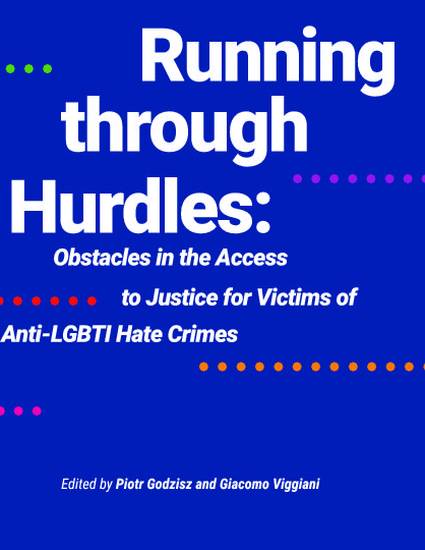
Contribution to Book
"Greece: Heading in the Right Direction, but with a Long Road Ahead" in Running through Hurdles: Obstacles in the Access to Justice for Victims of Anti-LGBTI Hate Crimes.
Running through Hurdles: Obstacles in the Access to Justice for Victims of Anti-LGBTI Hate Crimes
(2018)
Abstract
Abstract of edition:
"Across the European Union, LGBTI people face discrimination and violence based on their sexual orientation, gender identity, gender expression or sex characteristics. Most incidents are not reported which impedes the possibility to investigate hate crimes and prosecute offenders. Lack of reports renders the problem of anti-LGBTI hate crimes invisible to the public and may prevent authorities from acknowledging and addressing the problem. As a result, victims often suffer in silence and their rights may not be fully respected. By reviewing the legal and policy frameworks and analyzing the institutional deficiencies in reporting and recording anti-LGBTI hate crime and access to victim support in ten EU countries, this report sheds much needed light on the obstacles in the access to justice, faced by victims of anti-LGBTI hate crimes in the EU.
Summary of Chapter for Greece:
- There are several new measures and the legal framework is stronger than in the past; however, they are still not implemented as many of the provisions envisaged require reform of existing structures and procedures.
- The phenomenon of anti-LGBTQI is still rather controversial in Greece and creates conflict.
- There is a significant lack of expertise in recognizing and reporting, as well as supporting victims within a holistic model.
- Specialized training was acknowledged as needed in most parts of the research; as there is, indeed, a lack of knowledge of the conceptual framework of anti-LGBTQI hate crime.
- Underreporting is still a problem in Greece. Significant efforts have been made to improve this but much remains to be done.
- There is an absence of standardized procedures that are realistic and capable of implementation.
- There are a number of very good practices through which support is provided and underreporting is minimized, mostly provided by civil society organizations. These could be used as examples by the State, and applied to official services.
- State agencies and non-governmental reporting centers are creating specific protocols for supporting anti-LGBTQI hate crime victims in order to avoid secondary victimization and ensure long-term protection.
- A strong cooperation strategy is needed in order to ensure adequate recording of cases.
- There is a need to increase the visibility of services as well as the necessity [or impact] of them in order to highlight [and/or combat] the phenomenon.
- Official data collection on anti-LGBTQI hate crimes was absent until recently. In order to deal with the lack of official data and coordinate the different civil society reporting actors an initiative was undertaken by the UN Refugee Agency and the (Greek) National Commission for Human Rights. Today, Greek police record hate crimes more systematically, but there is still room for improvement".
Keywords
- Hate Crime,
- Hate Crime Law,
- Victim Support,
- Hate Crime Recording,
- Hate Crime Reporting,
- LGBT,
- LGBTQ,
- LGBTQI,
- LGBTI,
- Anti-LGBT Hate Crime,
- Homophobia,
- Transphobia,
- Biphobia,
- Gender Identity,
- Sexual Orientation,
- Sex Characteristics,
- Hate Crime Legislation
Disciplines
Publication Date
2018
Editor
Piotr Godzisz and Giacomo Viggiani
Publisher
Lambda Warsaw Association
ISBN
978-83-950283-8-0
Publisher Statement
This publication was produced as part of the project "Come Forward: Empowering and Supporting Victims of Anti-LGBT Hate Crimes", co-funded by the REC Programme (2014 – 2020) of the EU. The content of this publication does not reflect the official opinion of the European Union. Responsibility for the information and views expressed in the publication lies entirely with the author(s).
Citation Information
Thanasis Theofilopoulos, Irene Serafeim, Maria Moudatsou and Kostas Farmakidis. ""Greece: Heading in the Right Direction, but with a Long Road Ahead" in Running through Hurdles: Obstacles in the Access to Justice for Victims of Anti-LGBTI Hate Crimes." WarsawRunning through Hurdles: Obstacles in the Access to Justice for Victims of Anti-LGBTI Hate Crimes (2018) Available at: http://works.bepress.com/thanasis-theofilopoulos/8/
